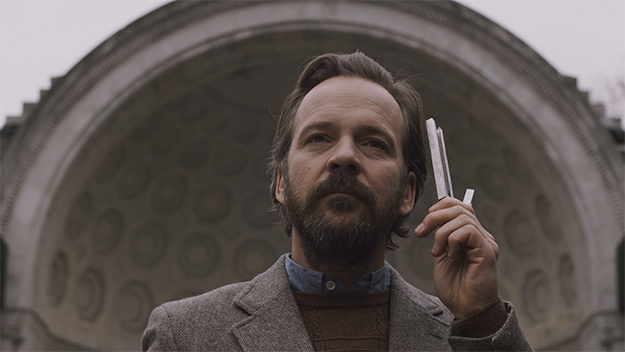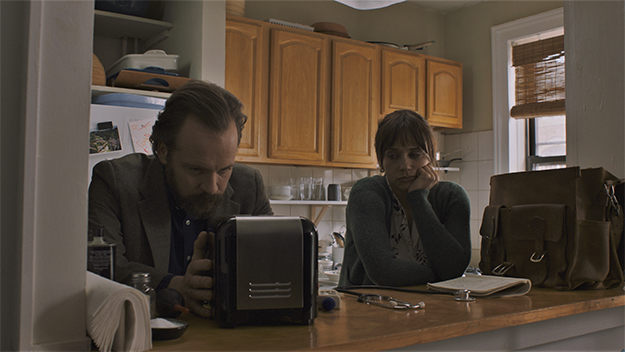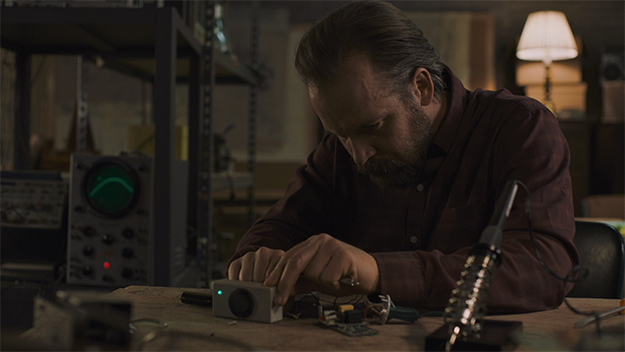Film of the Week: The Sound of Silence

Michel Chion, the French theorist of sound in film, once said that he was unimpressed by the idea of Dolby stereo, until he realized that the technology introduced a new instrument into the “orchestra” of cinematic sound: silence. Very few films directly concern themselves with sound in film—in the sense that they are designed to be about listening as much as looking—and among that select number, even fewer are about the possibilities of silence, or even quiet. One prime example in recent years is Philip Gröning’s 2005 documentary Into Great Silence, about life in a Trappist monastery, a surprise art-house hit among viewers eager for a contemplative experience that invites us not merely to listen to silence, but to participate in it too. A more extravagant example is John Krasinski’s high-concept sci-fi thriller A Quiet Place, whose characters had to live silently to evade blind aliens with super-sensitive hearing. It aimed to be a suspenseful symphony of shhh, giving viewers the novel experience of themselves feeling like survivalist Trappists for a couple of hours, or just feeling trapped. (This is an exciting prospect in principle, although it didn’t occur to some moviegoers at the London multiplex where I saw the film, who kept muttering, in between loud slurps of their soda, “It’s really quiet here…” Still, audience unrest is all part of cinema’s whole ambient package.)
A new film that maximizes the hush factor, to somewhat more philosophical purpose, is The Sound of Silence, a promising first feature by Michael Tyburski. This is a delicate character study that yields strange, stimulating ideas about noise and quiet, and that also proposes itself as something of an urban noise abatement manifesto. There are moments when the film also comes across as an inquiry into the pros and cons of that modish lifestyle choice, mindfulness.
It begins with a black and white clip of a noise expert in New York in the 1930s, who concludes from decibel readings that the noise of the city reduces people’s hearing by 45 percent. We then cut to Manhattan in our own time, with a sudden blast of urban racket implying that that percentage might today be racked up very considerably. This is a film that uses its sound dynamics very cleverly, if sometimes over-rhetorically; at any rate, the sound design by Grant Elder and Ian Gaffney-Rosenfeld is eloquent and meticulous throughout.
The protagonist is Peter Lucian (Peter Sarsgaard), who makes his living as a “house tuner”—in other words, he visits people’s homes, takes sound readings, and determines what is in their environments that causes them unexplained unrest, anguish, sleepless nights. It’s often something very subtle—and invariably something that can be explained in musical terms. One customer’s heating unit is tuned to B flat, while Ellen (Rashida Jones), his latest client, has a more complex problem: her toaster is in E flat, her fridge in G, making for a minor third that, when combined with the tonic created by the neighborhood, provides all the necessary factors for depression. Overall, he diagnoses, her apartment is in C minor: “the sound of resignation.” Peter doesn’t actually say, “That’s your problem right there,” but for him the symptoms and solutions all rack up neatly. Until they don’t. Something in his visit to Ellen sounds a false note, and we can guess what it might be: all the signals is that this will turn out to be a psycho-sonic romance.

A former musicologist, Peter explains that his practice lies in a background studying Bach, Stravinsky, and Beethoven’s use of “suspense… delayed gratification” (it’s perhaps no accident that he sounds a little like a film critic). He is a man of some professionalism and worldly success—there has even been an article about him in the New Yorker. But while he is in this world—and by “this world,” I mean the deafening bustle of Manhattan—he is not, apparently, of it. He operates alone, living and working in a cluttered space in a former fallout shelter—an austere equipment-crammed unit that recalls the lair of cinema’s great loner-listener, surveillance expert Harry Caul in Coppola’s The Conversation. He spends his time alone, plunging into contemplative silence, at work or in his private moments, cutting off from the city noise by slipping on noise-excluding headphones and tuning into some private resonance, some subtle tone that only he can hear, some secret music between the notes, as it were: his credo, as the New Yorker piece puts it, is that “the silence is full of sound.” Sometimes he seems to inhabit the city, but perhaps it’s a parallel sonic city that only he knows: he’s sporadically seen in Central Park, hitting tuning forks in combination and, it seems, inwardly analyzing their music. He’s a scientist, a musicologist, and, it’s implied, a mystic.
He may also be disturbed, or simply one of those obsessive males who populate cinema, whose commitment to a single theme (or single note) deafens them to the affective complexity of life (to the whole symphony, as it were). Sarsgaard is the ideal actor to play Peter Lucian: he himself radiates a sort of silence, a sometimes beatifically enclosed opacity. Few actors have the ability to communicate so little with their eyes and features, other than determined non-communicativeness (here his expressions are further muffled by a beard). His quiet, unruffled monotone suggests either inner calm or the quiet before the explosive tempest; everything suggests that Sarsgaard’s performance at some point will be a human parallel to the film’s sonic display of dynamic contrast.
It is possible that, on some level, Peter’s obsession is a real disturbance, albeit not necessarily a dangerous one: there’s no suggestion that his isolation and fixation on a strange idea make nearly as disturbed a city dweller as, say, the lone kabbalist-boffin in Darren Aronofsky’s Pi (although this film similarly uses intellectual exploration as its starting point for an exploration into the psyche). Peter’s big idea—his unified theory that underlies Everything—sounds like a good one, but also seems a little eccentric and unverifiable. He’s convinced that different parts of New York City have their own key, and has drawn up a sonic map of the city accordingly: Central Park, for example, is predominantly “the sound of nostalgia.”
Peter is determined to get his study published in the New American Journal of Sound: an academic publication that seems to exist in recording as much as on paper (Bach, and a purring female voice). But we suspect that things might not turn out the way he wants when his mentor (Austin Pendleton) gives him the standard academic warning that he should beware of having too much faith in his conclusions.

Peter’s eventual drama partly comes about when he agrees to take on the prof’s teaching assistant Sam (Tony Revolori, wonderfully stiff and nervy) as a helper and colleague, disrupting his isolation. It’s also partly brought about by an approach from an upmarket company called Sensory Holdings, who work in a similar area to Peter, but in a glossy lifestyle way: they offer “Urban Equilibrium,” and you just have to look at their offices to know that they embody the diametrical opposite of Peter’s artisanal approach: theirs is a big holistic package of corporate claptrap, as opposed to one man, some portable gizmos and a pair of ears.
What really tests Peter’s worldview, however, is his contact with Ellen. They become cautiously intrigued by each other from the start: you could say they tune in to each other, although they’re not remotely on the same frequency. When he tells her how the different notes of the city affect our emotional being—make us feel what we feel, whether we like it or not—she politely rejects his worldview as oppressive, deterministic: “Why does it have to be the permanent thing that controls us?” she says.
This is a very finely tuned film, not least in the acting, and the dissonance between Jones’s and Sarsgaard’s acting styles works very nicely (they keep us wondering whether their styles, and their characters’ emotions, will resolve in a final chord). Where Sarsgaard plays Peter as a man whose Zen exterior might well hide a seething affective cacophony, Ellen is a woman in a permanent crackle of anxiety; if you’re used to Jones’s sidelong looks of comic neurosis in Parks and Recreation, you’ll appreciate the very different key in which she plays discomfort here. Just take the moment when Peter leaves Ellen’s apartment, her sound pollution predicament apparently resolved to her satisfaction; he leaves the room, and the camera holds on her looking more apprehensive than ever.
Written by Tyburski and Ben Nabors, The Sound of Silence is a modest, contemplative study of ideas that itself exemplifies those ideas in its design, not least its sound design; it embodies a conceptual rumination. Its premise—an isolated, obsessed professional whose singular take on the world distorts every aspect of his personal life—puts one in mind of early Atom Egoyan, although Tyburski’s film is nowhere near as outré or provocative. The way it measures an abstract, scientific theory against plain everyday feelings—and the promise of a tender, satisfying payoff—is highly promising, but there’s a certain solemnity and reservedness that suggests that Tyburski is hesitant about playing with all the sounds in the orchestra, all the colors in the cinematic spectrum. He’s obviously not out to create a symphony, but the film frustratingly declines to rise too far above an étude.
And I mean that about the colors quite literally: Peter favors a wardrobe of oatmeal and beige, like camouflage for disappearing into a city that’s shot in much the same palette. The approach is thematically consistent, but it makes this a rather dull film to watch, and you almost sit up with a start when we see the vivid electric hues of the Sensory Holdings bus stop ads. There is one rather beautiful visual flourish towards the end, however, involving a city-wide blackout; it’s striking and impressionistic, although it feels a bit like Tyburski and DP Eric Lin telling us that in case we assumed they simply weren’t interested in visual style, here’s the proof that they were all along.
The score, by Will Bates, is appealing—I especially liked the insistent bass throb of the closing titles theme. But I almost wish I’d heard it on a soundtrack album, or in another film entirely. Tyburski lays it on too lavishly, and sometimes for too obvious effect; the music often seems misplaced in a film that’s about silence. I liked Bates’s piano, woodwind, gentle percussion, but I don’t always want to hear them; I want to hear the silence between sounds, or between the city, the soul, and the toaster.
Jonathan Romney is a contributing editor to Film Comment and writes its Film of the Week column. He is a member of the London Film Critics Circle.







